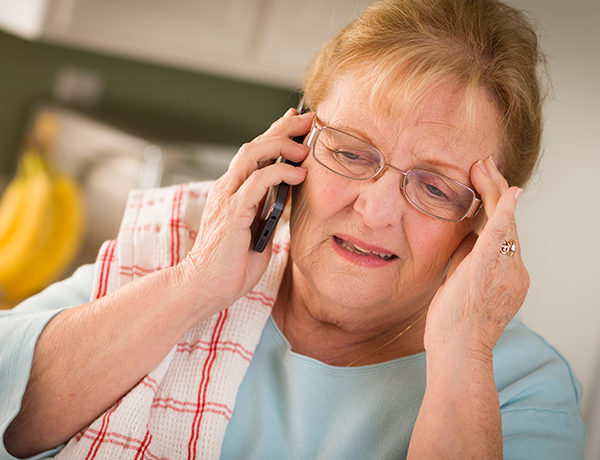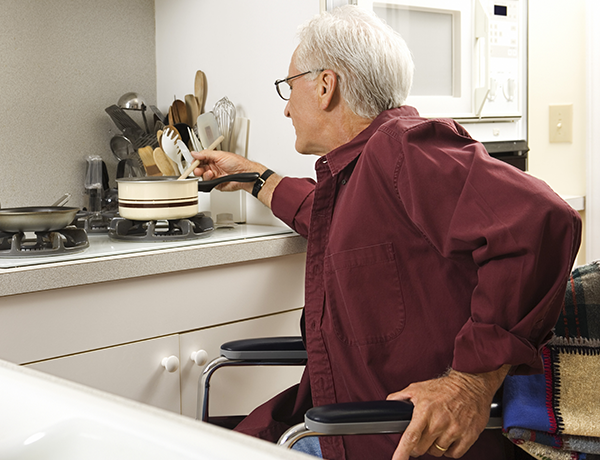The best time to make healthcare decisions is before a medical emergency happens.
When someone you love has a chronic illness, you want answers. What options for care are there? What can you expect? How can you prepare? How can we discuss issues with the family?
Journey is a free service for patients currently on our Home Health care service. Our Journey Counselors are patient advocates who provide guidance on available care options, when it may be time to consider another level of care, advance care planning, and more.
Complete the form to begin a conversation and discover how this unique program can help you get the information you need for mapping your journey.
Connect with a Journey Counselor.


 For aging adults who live independently, adjusting their home environment for reasons of safety or accessibility can feel like an admission of defeat. However, putting off such improvements exposes aging individuals to greater risk of even more serious injuries — the kind that threaten the very self-sufficiency they are protecting. Rather than ignoring the changing needs and capabilities that often come with age, the best way to preserve independence and continue aging in place is to welcome these alterations as a way to stay safely at home.
For aging adults who live independently, adjusting their home environment for reasons of safety or accessibility can feel like an admission of defeat. However, putting off such improvements exposes aging individuals to greater risk of even more serious injuries — the kind that threaten the very self-sufficiency they are protecting. Rather than ignoring the changing needs and capabilities that often come with age, the best way to preserve independence and continue aging in place is to welcome these alterations as a way to stay safely at home.
 Some health concerns require the kind of life-saving medical care and urgency that the 911 service is designed for, but others may not. When a loved one needs prompt medical care, consider these points. But if you’re ever in doubt, 911 emergency services are there to help you make the right choice for your loved one.
Some health concerns require the kind of life-saving medical care and urgency that the 911 service is designed for, but others may not. When a loved one needs prompt medical care, consider these points. But if you’re ever in doubt, 911 emergency services are there to help you make the right choice for your loved one. Whether caused by glaucoma, diabetic retinopathy, cataracts, macular degeneration, side effects of regular medication, or other reasons, low vision affects many seniors. Impaired eyesight can interfere with leisure activities such as reading and watching television, which has the potential to disrupt day-to-day living, hinder engagement, and even lead to depression.
Whether caused by glaucoma, diabetic retinopathy, cataracts, macular degeneration, side effects of regular medication, or other reasons, low vision affects many seniors. Impaired eyesight can interfere with leisure activities such as reading and watching television, which has the potential to disrupt day-to-day living, hinder engagement, and even lead to depression. The kitchen and bathroom rank among the most hazardous rooms of the home, yet they are essential to daily life — thus, when considering modifications for yourself or your loved one, these key areas deserve the utmost attention. The following suggestions are just some of the options available. With a better understanding of possible home risks and adjustments, as well as the guidance of an in-home occupational therapist, you can drastically improve not only your loved one’s safety from falls or other injuries, but also his or her independence and quality of life.
The kitchen and bathroom rank among the most hazardous rooms of the home, yet they are essential to daily life — thus, when considering modifications for yourself or your loved one, these key areas deserve the utmost attention. The following suggestions are just some of the options available. With a better understanding of possible home risks and adjustments, as well as the guidance of an in-home occupational therapist, you can drastically improve not only your loved one’s safety from falls or other injuries, but also his or her independence and quality of life.  Pet ownership has been shown to have numerous benefits for emotional health and quality of life, especially in seniors. However, having a pet in the household can pose disadvantages and dangers that are also important to consider.
Pet ownership has been shown to have numerous benefits for emotional health and quality of life, especially in seniors. However, having a pet in the household can pose disadvantages and dangers that are also important to consider.